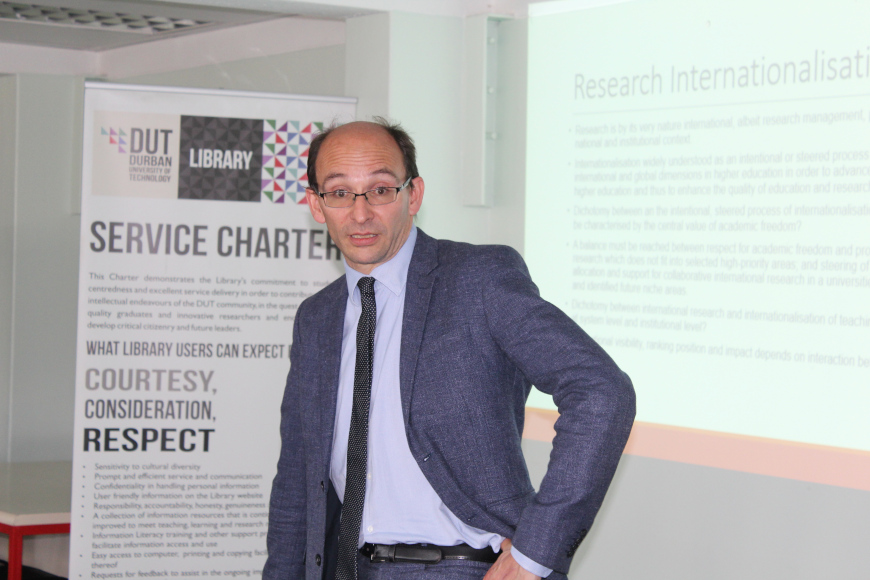The Durban University of Technology’s (DUT’s) International Education and Partnerships (IEP) Directorate recently hosted an international education expert, Cornelius Hagenmeier at the ML Sultan Campus.
Hagenmeier is the Director for International Affair at the University of Free State, he is also a Board Member for the African Centre for Higher Education Internationalisation. He delivered his talk on the topic: Internationalisation of the Curriculum and Internationalisation of Research – Developing Strategy in a Changing Global and Local Environment.
He gave an overview of the policy framework for internationalisation of higher education in South Africa. He said the policy framework provides that higher education institutions must internationalise their curricula in order to provide an alternative mode of internationalisation that can overcome the limitations inherent in international mobility schemes that remain accessible to a minority of students.
“The internationalisation of the curriculum is the incorporation of international, intercultural and/or global dimensions into the content of curriculum as well as the learning outcomes, assessment tasks, teaching methods and support services of a programme of study. However, internationalisation of the curriculum must not negate curriculum transformation imperatives that higher education institutions in South Africa have an obligation to fulfil; the two can be carried out together successfully,” he said.
He indicated that there are some challenges that may impede the internationalisation of the curriculum in the South African context. He spoke about his personal experience of an attempt to implement an Australian model of internationalisation of the curriculum at a South African rural-based HDI.
“In internal discussions amongst academic leaders, it became apparent that using an imported blueprint for internationalisation of the curriculum would be counter-productive and not acceptable. Later, the approach changed and we developed the understanding that internationalisation of the curriculum should be incorporated conceptually in the broader curriculum transformation process and linked it to the process of Africanisation,” said Hagenmeier.
On research internationalisation Hagenmeier said: “Higher education institutions must create and facilitate access to research and academic opportunities abroad for their staff members. Institutions must also consider initiatives to attract South African and African scholars in the diaspora as collaborating partners to strengthen South Africa’s research and development programme.”
He also urged South African universities to consider their own, context-specific models for internationalisation, and proudly consider what they have to offer to the world when structuring their internationalisation processes.
“The way we internationalise will have to respond to the 4th industrial revolution through use of technology, research themes, and generating intellectual discourse on opportunities, risks and new developments. A stronger focus on diversifying knowledge paradigms and connecting South Africa to other African and Global South knowledge paradigms should be considered both for curriculum and research internationalisation,” he added.
Pictured: Cornelius Hagenmeier addressing DUT staff.
Nduduzo Ndlovu


